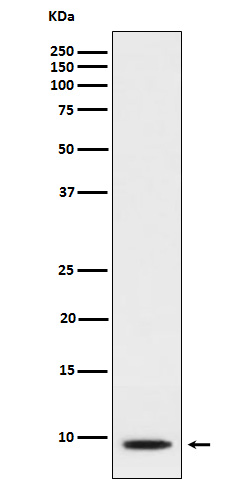
| WB | 咨询技术 | Human,Mouse,Rat |
| IF | 1/20-1/50 | Human,Mouse,Rat |
| IHC | 咨询技术 | Human,Mouse,Rat |
| ICC | 1/50-1/200 | Human,Mouse,Rat |
| FCM | 咨询技术 | Human,Mouse,Rat |
| Elisa | 咨询技术 | Human,Mouse,Rat |
| Aliases | AMCFII; Cxcl5; ENA78; SCYB5;;CXCL5 |
| WB Predicted band size | Calculated MW: 12 kDa ; Observed MW: 10 kDa |
| Host/Isotype | Rabbit IgG |
| Antibody Type | Primary antibody |
| Storage | Store at 4°C short term. Aliquot and store at -20°C long term. Avoid freeze/thaw cycles. |
| Species Reactivity | Human |
| Immunogen | A synthesized peptide derived from human CXCL5 |
| Formulation | Purified antibody in PBS with 0.05% sodium azide,0.05% BSA and 50% glycerol. |
+ +
以下是关于CXCL5抗体的3篇代表性文献的简要信息:
1. **文献名称**:*CXCL5 mediates immunosuppression in the tumor microenvironment via recruitment of polymorphonuclear myeloid-derived suppressor cells*
**作者**:Jia, L., et al.
**摘要**:该研究通过使用抗CXCL5抗体阻断小鼠肿瘤模型中的CXCL5信号,发现其显著减少肿瘤微环境中PMN-MDSCs(多形核髓源性抑制细胞)的浸润,增强抗肿瘤免疫反应并抑制肿瘤生长,提示CXCL5抗体在调节肿瘤免疫抑制中的作用。
2. **文献名称**:*Targeting CXCL5 inhibits hepatocellular carcinoma progression via suppression of myeloid-derived suppressor cell infiltration*
**作者**:Zhou, S.L., et al.
**摘要**:研究显示,肝癌患者中CXCL5高表达与MDSCs积累相关。使用CXCL5中和抗体可显著减少小鼠模型中MDSCs的募集,抑制肿瘤血管生成和转移,为肝癌治疗提供潜在靶点。
3. **文献名称**:*Neutralization of CXCL5 attenuates neutrophilic inflammation in LPS-induced acute lung injury*
**作者**:Chen, Y., et al.
**摘要**:该研究通过体内实验证明,抗CXCL5抗体可抑制脂多糖(LPS)诱导的急性肺损伤模型中中性粒细胞的肺内浸润,降低促炎细胞因子水平,表明CXCL5抗体在炎症性疾病中的治疗潜力。
CXCL5 (C-X-C motif chemokine ligand 5), also known as epithelial-derived neutrophil-activating peptide 78 (ENA-78), is a small secreted protein belonging to the CXC chemokine family. It is primarily produced by epithelial cells, endothelial cells, and immune cells such as macrophages and neutrophils. CXCL5 plays a critical role in inflammatory responses by recruiting neutrophils and other immune cells to sites of infection or tissue injury through interaction with its receptor, CXCR2. Beyond inflammation, CXCL5 is implicated in pathological processes, including cancer progression, angiogenesis, and wound healing. Dysregulated CXCL5 expression has been observed in various cancers (e.g., lung, colorectal, and breast cancers), chronic inflammatory diseases, and autoimmune disorders, making it a potential therapeutic target.
CXCL5 antibodies are essential tools for detecting and quantifying this chemokine in research and diagnostic applications. Polyclonal and monoclonal antibodies against CXCL5 enable techniques such as Western blotting, ELISA, immunohistochemistry (IHC), and flow cytometry to study its expression patterns, localization, and regulatory mechanisms in biological samples. Neutralizing antibodies targeting CXCL5 have shown promise in preclinical studies by blocking CXCR2-mediated signaling pathways, thereby suppressing neutrophil infiltration, tumor growth, and metastasis. However, challenges remain in optimizing antibody specificity, affinity, and stability for reliable outcomes. Continued research on CXCL5 antibodies may advance our understanding of its role in disease pathogenesis and support the development of targeted therapies for inflammation-driven conditions and cancer.
×